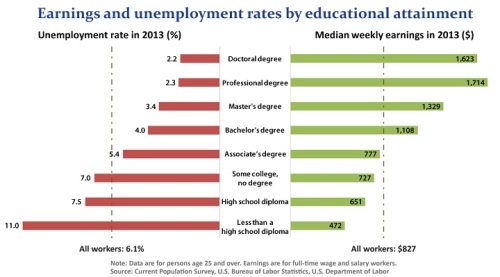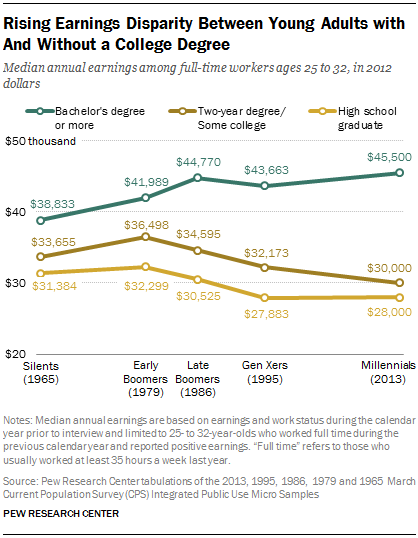Is a College Degree Necessary Today? | Celt Admission Blog
You’ve heard the naysayers. You know, the people who say that a college degree isn’t worth the cost. Sure, there are good-paying jobs out there that don’t require a college degree, if you want to be a welder, salesperson or oil worker in North Dakota. But research shows that it’s a lot harder to get a job, build wealth and be happy without a college degree. It’s still true that for most people, college is an investment worth making.
In fact, college is the single best predictor of socioeconomic success, according to Richard Parker, author of “Lone Star Nation: How Texas Will Transform America” who was a guest on Houston Matters on Oct. 31.
Take a look at why a college degree is important and how it helps graduates be more successful.
1. How much do college graduates earn?
Workers with a bachelor’s degree enjoy an annual income nearly $20,000 higher than workers who only have completed high school.
According to a Pew Research Center report from 2014, Millennials who usually worked full-time in 2012, with at least a bachelor’s degree had median annual earnings of $45,500, well over the medians for people with only some college ($30,000) or a high-school diploma ($28,000).
The value of a college degree is even higher today than it was 50 years ago. The gap has widened across the generations: In 1965, when the members of the Silent Generation were 25 to 34 years old, median earnings for high-school graduates were 81 percent of those for college graduates; in 2013, among the Millennials, it was 61.5 percent.
2. What is the unemployment rate for college graduates?
Higher education is the best insurance against unemployment. When overall unemployment rates were hovering around 10 percent, only 4.5 percent of college graduates were unemployed.

During the Great Recession of 2008-2010, four out of five jobs that were lost were held by Americans with a high school education or less.
A recent NY Times article says college is becoming the new high school diploma. It’s the new minimum requirement for getting a job, meaning many businesses now expect file clerks and errand runners to have a degree.
By 2018, 63 percent of all jobs in the U.S. will require post-secondary education, according to the Georgetown University Center on Education and Workforce.

3. Are college graduates healthier?
According to a study from the University of Notre Dame, another one of the benefits of a college degree is that graduates experience long-term health effects not seen in non-college grads.
College graduates are more likely to get jobs with benefits, which has it’s… benefits. The study took into account factors such as better health insurance and higher wages enjoyed by college graduates, as well as the relationship between college completion and various health behaviors such as smoking, exercise and obesity.
According to data from the Commission on Health, college graduates can expect to live at least five years longer than those who haven’t finished high school, especially men, who see a difference of 6.8 years between college grads and high school dropouts, says collegestats.org.
4. Do college graduates have more wealth?
People with a bachelor’s degree make 84 percent more over a lifetime than high school graduates, according to Georgetown’s Center on Education and the Workforce.
On average, a doctoral degree-holder will earn $3.3 million over a lifetime, compared to $2.3 million for a college graduate and $1.3 million for those with a high school diploma.
5. Are college grads more likely to be married and less likely to be living in their parent’s homes?
According to the Pew Research Center,
for college-educated Millennials, 45 percent are married and only 12 percent are living in a parent’s home. For Millennial high school grads, 40 percent are married and 18 percent live at home.
6. Does a college degree improve career opportunities?
Job satisfaction factors into the decision to pursue a college degree as well. According to the Pew Research Center, college-educated Millenials are more likely to see themselves on a career path, rather than just working at a job to get them by.
It’s necessary to get a college degree because employers are looking for employees with both technical knowledge in their field and also practical experience solving workplace problems.
The Economist Intelligence Unit survey of March 2014, said the top skills companies considered important were:
– Critical thinking and problem solving (72%)
– Collaboration/teamwork (63%)
– Communication (54%)
– Technical skills associated with the job (54%)
These are the kind of skills students learn with a liberal arts degree from the University of St. Thomas in Houston. Because college is about more than your major. It’s about learning how to think and adapt to the changing workplace.
So if you’re still asking yourself, “should I go to college?” the answer is definitely, Yes, college is worth it.
By Brenda Cooper




